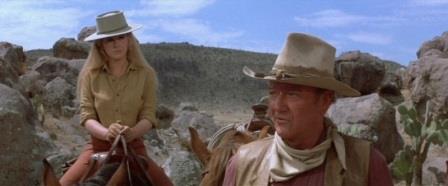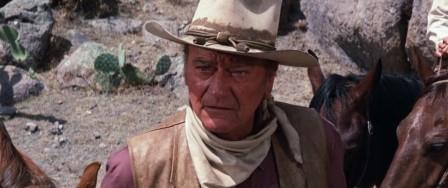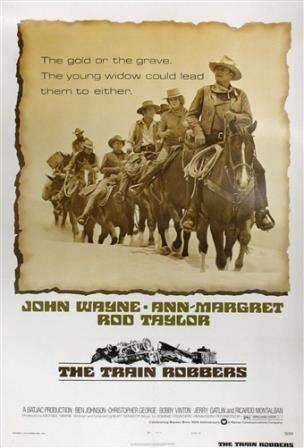The gold or the grave. The young widow could lead them to either.
Rarely did John Wayne make a truly bad film (though there are a few) in his long career, though towards the end of his career he tended to mix things up by following a strong role (as in True Grit) with easier, less taxing roles as those in Rio Lobo or today’s topic, 1973’s The Train Robbers.
The Train Robbers has gotten perhaps more than its fair share of criticism over the years, including a weak (or non-existent) villian, lots of horseback riding and campfire filler scenes, a tepid script and lackluster love interest. Though all of the above have some merit, the biggest flaw of The Train Robbers is that it is a John Wayne film and the bar is rather high. This isn’t Red River or one of Wayne’s many John Ford efforts. This one has to be taken in its proper context as a later Wayne film, and as such features and older and more thoughtful Wayne who was visibly not well. By 1973 Wayne was already a cancer survivor, down to one lung and even suffering from broken ribs during the filming of The Train Robbers.
In spite of that, Wayne does a decent job in a somewhat routine story of a group of Civil War veterans (led by Wayne as Lane) in the employ of a young widow (Ann Margret as Mrs. Lowe) seeking to recover gold that her father stole. Others in the gang include actors Rod Taylor, Ben Johnson and Bobby Vinton- though they are rather faceless placeholders. Ricardo Montalban has a small but pivotal role as the nameless “Pinkerton Man” whose mysterious inclusion only makes sense in the final plot-twisting scene that’s one of the highlights of the picture.
 There’s an almost forced romantic subplot between Wayne and Ann Margret which feels not only formulaic but also lacks any chemistry while surprising no one as it develops. Thankfully once Mrs. Lowe (Margret) finally confesses her feelings (right on queue) towards the end of the picture, Wayne nips it in the bud with one of the better lines of the picture, stating simply, “I’ve got a saddle that’s older than you are, Mrs. Lowe.” Things surely wouldn’t play out in a similar way today.
There’s an almost forced romantic subplot between Wayne and Ann Margret which feels not only formulaic but also lacks any chemistry while surprising no one as it develops. Thankfully once Mrs. Lowe (Margret) finally confesses her feelings (right on queue) towards the end of the picture, Wayne nips it in the bud with one of the better lines of the picture, stating simply, “I’ve got a saddle that’s older than you are, Mrs. Lowe.” Things surely wouldn’t play out in a similar way today.
Ann Margret feels a bit miscast and out of sorts throughout the picture, looking tired in many scenes and overall lacking the gravitas you’d expect in a young widowed mother of one. Outside of her numerous campfire scenes with Wayne she too at times becomes almost a hanger-on.
The one thing most everyone can agree on is that The Train Robbers is a beautifully shot picture, featuring William Clothier’s last effort as a cinematographer. There are many panoramic shots- especially one long-shot of Wayne’s group on horseback silhouetted against the horizon reminiscent of scenes in Clothier’s earlier effort in The Horse Soldiers– that elevate The Train Robbers from the realm of strong TV movie ilk. Though at times these also require some of the extensive riding scenes, the results are truly exceptional.
 Given Wayne’s health, there is a surprising amount of action throughout the picture, though in many cases Wayne isn’t the key protagonist in them. When he is (as in the final fight) he looks labored: at other time during the picture he’s clearly out of breath even in some of the good dialogue scenes.
Given Wayne’s health, there is a surprising amount of action throughout the picture, though in many cases Wayne isn’t the key protagonist in them. When he is (as in the final fight) he looks labored: at other time during the picture he’s clearly out of breath even in some of the good dialogue scenes.
Dominic Frontiere’s score merits some mention, as it tries so hard to sound like Elmer Bernstein. Mostly it’s unsuccessful in this regard, oftentimes simply to brash or to quiet to match the onscreen action.
The Train Robbers is an enjoyable if un-taxing film. It’s currently in fairly heavy rotation on GRIT-TV and there’s far worse ways to spend ninety minutes.
[embedyt] https://www.youtube.com/watch?v=fkdxczKuT5w[/embedyt]
